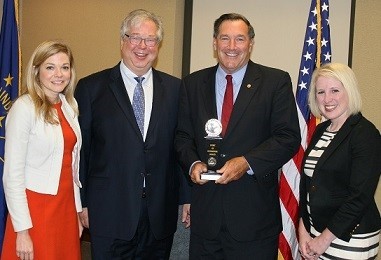A record group of more than 100 of the state’s top business leaders and government affairs executives will be attending the Indiana Chamber’s annual D.C. Fly-in on September 27 and 28. The timing couldn’t be more perfect with a potential health care reform vote, rollout of a tax reform plan and the end of the fiscal year all taking place.
 This year, legislative briefings will be conducted by congressional members, who will be highlighting key public policy areas that line up with their committee assignments and expertise:
This year, legislative briefings will be conducted by congressional members, who will be highlighting key public policy areas that line up with their committee assignments and expertise:
- Tax reform – Indiana 2nd District U.S. Rep. Jackie Walorski
- Regulatory reform – Indiana 9th District U.S. Rep. Trey Hollingsworth
- Health care reform – Indiana 8th District U.S. Rep. Larry Bucshon
- Infrastructure and transportation policy – Indiana 4th District U.S. Rep. Todd Rokita
- Education policy – Indiana 6th District U.S. Rep. Luke Messer
There is still time to register for the D.C. Fly-in; go to www.indianachamber.com/specialevents.
Make sure to follow us on Twitter at @IndianaChamber or #ICCinDC for up-to-the-minute important information on what’s happening in Washington.
Zimmer Biomet is the Fly-in’s dinner sponsor. Allegion is the cocktail reception sponsor. Build Indiana Council is the legislative briefing sponsor.
Event sponsors are AT&T, The Boeing Company, Duke Energy, The Kroger Co., Old National Bank and Wabash Valley Power.


 While the presidential election may be the talk of D.C. and the media, this is also a busy time of the year for federal policy conversations for the Indiana Chamber.
While the presidential election may be the talk of D.C. and the media, this is also a busy time of the year for federal policy conversations for the Indiana Chamber. Any time eight members of a nine-person Congressional delegation can agree on something these days, it must be a good thing. That is the case with the Small Business Paperwork Mandate Elimination Act of 2011.
Any time eight members of a nine-person Congressional delegation can agree on something these days, it must be a good thing. That is the case with the Small Business Paperwork Mandate Elimination Act of 2011. In a piece for Advertising Age aptly titled, "Sometimes You Need to Let the Town Drunk Coach the Team," Tom Denari, president of the Indiananpolis-based ad firm Young & Laramore, explains how Angelo Pizzo’s cinematic masterpiece (a.k.a. "the best movie ever made" in this critic’s opinion) can help you manage your brand. The advice is timely and quite creative. Here’s a 20-second timeout’s worth, but I’d advise you read the
In a piece for Advertising Age aptly titled, "Sometimes You Need to Let the Town Drunk Coach the Team," Tom Denari, president of the Indiananpolis-based ad firm Young & Laramore, explains how Angelo Pizzo’s cinematic masterpiece (a.k.a. "the best movie ever made" in this critic’s opinion) can help you manage your brand. The advice is timely and quite creative. Here’s a 20-second timeout’s worth, but I’d advise you read the